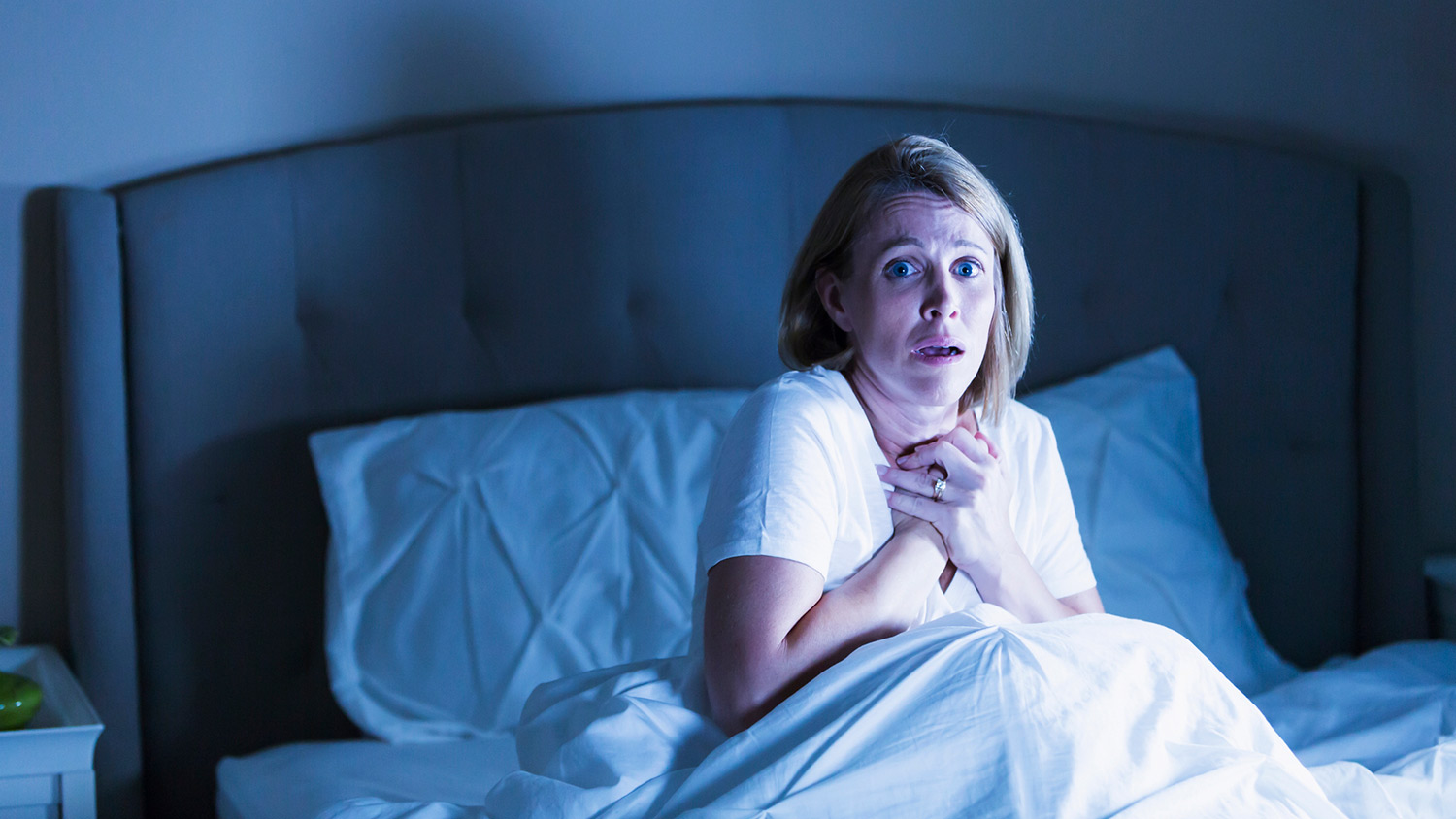What is exploding head syndrome? We ask a sleep expert
Have you suffered from exploding head syndrome as you sleep?

As sleep disorders go, exploding head syndrome seems like a slightly disturbing one, but fortunately, it’s not as painful as it sounds – just a little more frightening, especially if it’s the first time you’ve suffered from it.
You may have even experienced exploding head syndrome without quite knowing the exact phrase for it. The sleep disorder occurs when you’re either just drifting off to sleep, or you’re in a deep sleep – you’re then woken up by a loud sound, like a crash or explosion, in your head.
According to stats, around 10-15 per cent of us have suffered from exploding head syndrome, whether it was a one-time experience or we’ve suffered from it over a period of time.
But, what causes exploding head syndrome and is it dangerous? We look at the latest research and talk to a sleep expert about exploding head syndrome and how you can avoid the symptoms.
What are the symptoms of exploding head syndrome?

As the name suggests, for those who experience exploding head syndrome the symptoms are loud noises, such as a bang, explosion, fireworks or crash. This sound occurs when you’re asleep and you’ll replicate the reaction; shock - as though you’re hearing the sound in reality.
Some who have experienced exploding head syndrome have other symptoms such as bright lights and feeling panicked as they wake up. This loud crashing sound, or bright lights, causes you to wake up abruptly, and usually in a panic, with a racing heartbeat. The symptoms cause more mental stress, rather than physical damage, but could scare you and disrupt your sleep in much the same way sleep paralysis can.
“The hallucinations experienced by exploding head sufferers are usually loud and dramatic, similar to an explosion or a car crash, which can be scary and cause the individual to wake up in a confused panic,” explains Dr. Chelsie Rohrscheib, head sleep expert and neuroscientist at Wesper.
Get daily insight, inspiration and deals in your inbox
Sign up for breaking news, reviews, opinion, top tech deals, and more.
“When exploding head syndrome is frequent, it can be considered a type of parasomnia sleep disorder, defined as an abnormal behaviour or experience during sleep.”
A study in 2020 of over 3000 people who suffered from the syndrome also found that fear was a major symptom associated with the disorder. Nearly half (44%) of patients experienced “significant fear” after waking up from the loud noise they heard.
The sleep disorder wasn’t officially named until 2015, but records go back to the 1900s, with American neurologist Silas Weir Mitchell recording two cases of his patients experiencing similar symptoms.
What causes exploding head syndrome?
There is no definitive cause for exploding head syndrome, although it is thought that stress and tiredness, plus other sleep disorders, could cause the symptoms to occur or reoccur.
“Scientists don’t fully understand what causes hallucinations during sleep, including those that cause exploding head syndrome. Because they primarily occur during transition periods, such as falling asleep and waking up, it is believed they are the result of an inappropriate misfiring of neurons, the communicating cells of the brain, in the brain’s auditory censors,” says Rohrscheib.
“This means that neurons that would normally be activated only when we hear a sound, are being activated when no sound is present.”
Rohrscheib explains that some other factors can also cause the symptoms to occur or worsen. “Several factors can contribute to frequent episodes of exploding head syndrome, including certain sleep disorders like narcolepsy, chronic sleep deprivation, certain neurological conditions, drug and alcohol use, and seizure disorders.”
There are no extensive studies on who is more likely to suffer from the syndrome, but some small studies show that women and college students are more likely to experience the symptoms.
Is exploding head syndrome dangerous?
The name of the sleep condition makes it sound more dangerous than it is - but for anyone that has experienced it, it’s more of a nuisance than anything life-threatening. If you experience the condition you may feel scared and your sleep will be disturbed, but the condition won’t affect you physically.
Rohrscheib agrees: “Most people may wake up frightened and confused but are at minimal risk of hurting themselves.” However, she goes on to explain: “Exploding head could become problematic over time if it leads to excessive sleep loss, which may raise a person’s risk for injury and illness.”
Studies have also shown that educating yourself on the syndrome can lessen symptoms, including the panic associated with the syndrome, as it allows you to understand that the syndrome is more mental rather than physical.
How can you prevent exploding head syndrome?

As the closest causes for exploding head syndrome are stress, tiredness and other sleep disorders, making sure you have the right sleep environment and you’re as relaxed as possible is the healthiest way to try and prevent any symptoms.
This means making sure your sleep environment is at the right temperature and you feel comfortable - this could mean figuring out if your bedding is helping or hindering your sleep health, and possibly investing in one of the best mattresses or best pillows.
There are no known treatments for exploding head syndrome, however. Rohrscheib explains: “Treatments will depend on if there is an obvious cause, such as an underlying sleep disorder or health condition. Often, ensuring that you are getting high-quality sleep and are not frequently sleep deprived will help to reduce your episodes.”
The side on which you sleep will also affect the quality of your sleep, with experts confirming that sleeping on your side is the healthiest for us. Finding the best sleep window for you, and sticking to it, even on weekends, can also help you nod off faster, sleep deeper and deter sleep syndromes.
Meditation has been proven to help sleep disorders such as insomnia and could help you relax as your drift off or alleviate symptoms of exploding head syndrome. If you’re not familiar with meditation, apps such as Calm or Headspace take you through short sequences which relax your body and mind.

Dr. Rohrscheib is a sleep expert, neuroscientist, and sleep consultant with over 10 years of experience in the field of sleep. She holds a bachelor’s degree in Biomedical Science with Honors and a Ph.D. in Neuroscience with a specialty in sleep genetics. She also worked in clinical trials where she oversaw sleep apnea research.
Sarah is a freelance writer - writing across titles including Woman&Home, Fit&Well, TechRadar, the Independent and the BBC. She covers a variety of subjects, including trends in beauty, business and wellness - but her biggest passions are travel and fitness. She can normally be found trying out the latest fitness class or on a plane to an exotic destination. While she loves to combine the two - signing up to do hiking holidays in LA, intense boot camps in Bali - last year she went on her dream activity holiday: paddleboarding around deserted islands in Croatia.
